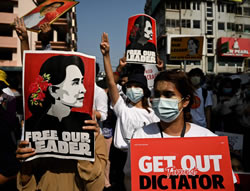 Myanmar’s Public Servants are standing firm in the face of threats and increasing violence from the military junta as a civil disobedience movement seeks to thwart the generals by paralysing the bureaucracy.
Myanmar’s Public Servants are standing firm in the face of threats and increasing violence from the military junta as a civil disobedience movement seeks to thwart the generals by paralysing the bureaucracy.
Public hospitals are deserted; Government offices are empty and dark, and trains do not leave the stations.
A university lecturer, who asked journalists to use the pseudonym Thida, said the military needed to prove they could manage the country well as the Government they overthrew three weeks ago.
“If we … the Civil Servants don’t work, their plan to take power will fail,” Thida said.
Thida has refused to teach her online classes. She joined the nationwide walkouts kicked off by medical workers, many of whom are now in hiding to evade arrest.
From the capital to seaside ports, work stoppages in the private sector have hollowed out offices and factories and forced many bank branches to shut.
However, it is the Public Servants’ swelling ranks within the resistance that has the junta particularly rattled.
Without them, it is unable to collect taxes, send out electricity bills, test the population for COVID-19 or simply keep the country running.
The spectre of a financial crisis — already brewing because of the pandemic downturn and a decline in foreign investment — looms large.
It remains unclear how many of the roughly one million public sector workers are participating.
One crowd-sourced survey found members of all 24 Government Ministries were now involved, while the United Nations Special Rapporteur on Myanmar has estimated three-quarters of Public Servants were on strike.
One analyst, who asked to remain anonymous as the junta had detained more than 700 of its critics, said the military did not anticipate that a large part of the Public Service would walk out and leave it without a State apparatus.
“The impact of the movement doesn’t necessarily depend on all of the bureaucracy participating, but on key parts paralysing the military’s ability to collect revenue and distribute it across the State machinery,” the analyst said.
The analyst believed the crunch would come when the junta confronted a payday for the entire public sector — including the military it depends on.
Naypyitaw, 28 February 2021









